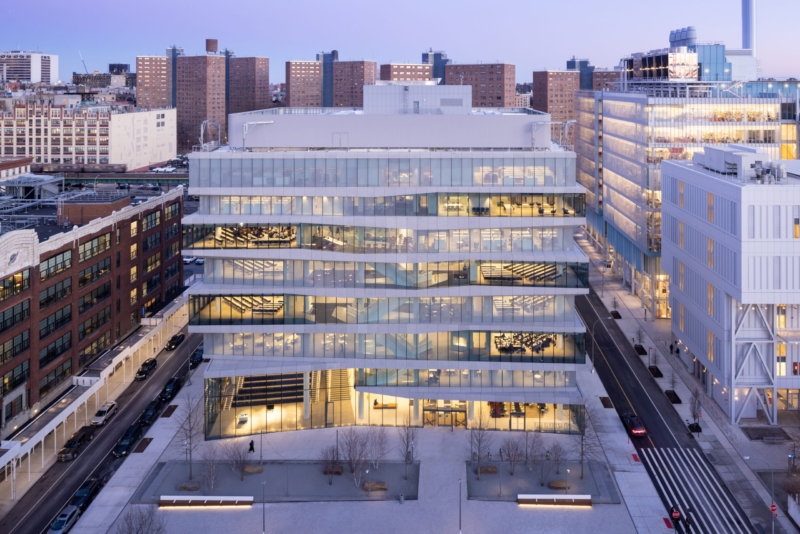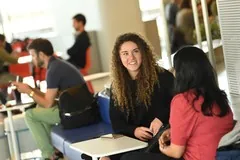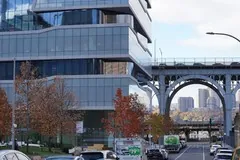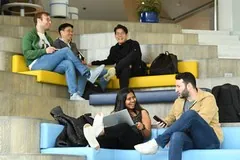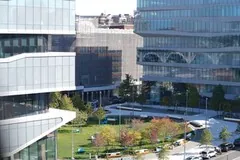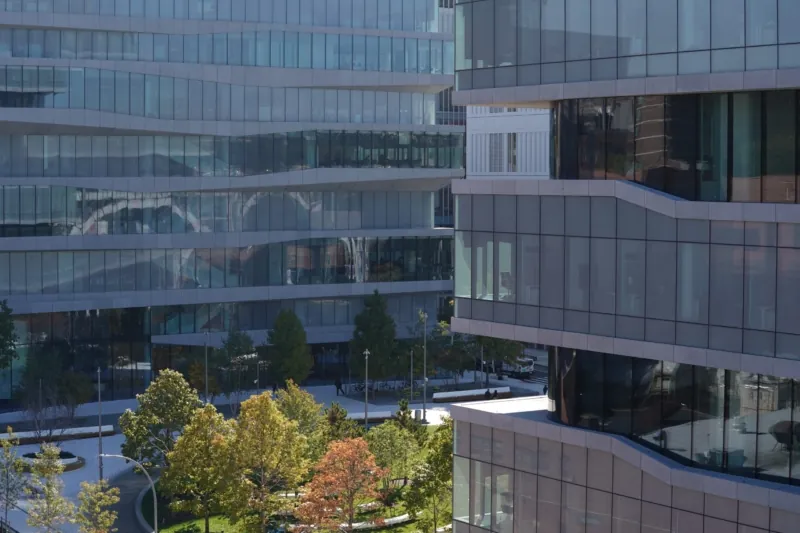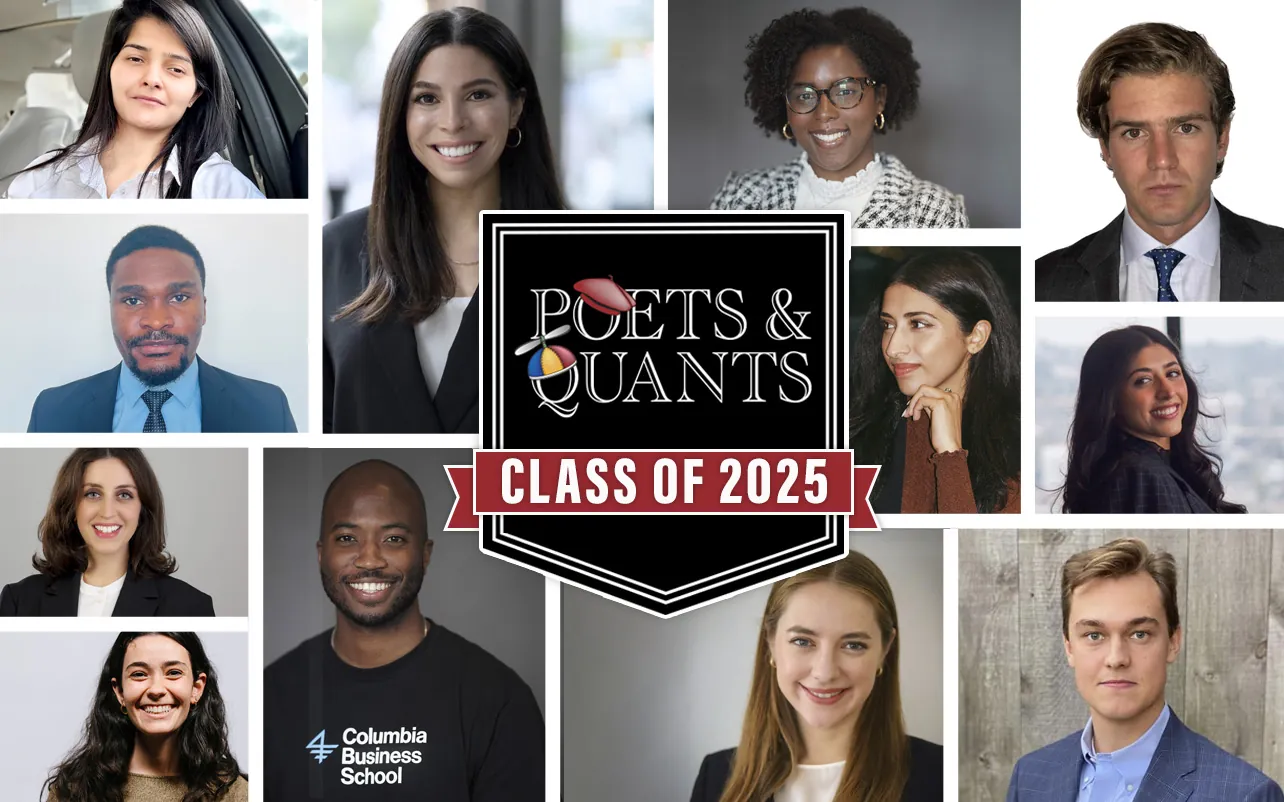
Meet Columbia Business School’s MBA Class Of 2025

A network. A system. A community. Evolving, growing, collaborating. Interconnected and interdependent.
Call it a business ecosystem – a series of collisions that eventually produce shared values and resources. It sparks ideas that stretch boundaries and partnerships that mobilize talent. There is no ecosystem more diverse or influential ecosystem than New York City – and no better way to break into it than Columbia Business School.
The city is the headquarters for 47 Fortune 500 companies. Think JP Morgan, Verizon, Pfizer, 21st Century Fox, and Philip Morris. There’s Wall Street for finance, Seventh Avenue for fashion, Broadway for entertainment, and Fifth Avenue for advertising and publishing. Even Google has 12,000 full-timers there. Lanier Mason, a Hempstead native and senior auditor at Ernst & Young before joining Columbia Business School this summer, describes New York City as “the embodiment of energy and movement” – a place where you die if you stand still. That spirit may be one reason why the Big Apple ranks 2nd globally for entrepreneurship according to Startup Genome. That translates to $22 billion dollars in early-stage investment from 2020-2022 – and 98 unicorns during the same period.
Architectural and exterior photography of Henry R. Kravis Hall and David Geffen Hall, by photographer Iwan Baan
Stock photos of CBS Manhattanville campus
A SHORT DISTANCE TO EVERYTHING IMAGINABLE
“New York City is the epicenter of cultural experiences and business opportunities across many industries,” says Ijeoma Chimezie, a ’23 CBS alum. “You’re always only an Uber drive or subway stop way from any opportunity or experience you’re looking for, whether it’s an art exhibit, industry focused conference or networking event.”
Certainly, Columbia Business School enjoys the advantage of being based in a “central hub for a range of diverse industries,” says Taiye Opabunmi, a surgeon from Nigeria. For example, the school can draw from a wide range of fields and functions for adjuncts ad class speakers. Such benefits, he says, will enable his classmates to access in-semester internships at major corporations and startups alike. That’s just one of the ways that MBAs can gain additional experience not often available at other business schools.
“As a student in this city, you’re not just limited to the classroom; you get hands-on exposure to real-world business dynamics, gaining insight into the pulse of global commerce,” explains Jose Antonio Alonso Beckmann, a self-described “family man” and “tequila entrepreneur. “The city’s diverse cultural fabric adds another layer of richness to the learning experience, exposing you to many perspectives at your doorstep. NYC’s status as home to numerous Fortune 500 companies, startups, and industry events offers limitless networking opportunities. This unique positioning allows students to build connections, learn directly from industry leaders, and explore finance, fashion, technology, spirits, or media sectors.”
NEVER FAR FROM HOME
CBS Students
This diversity – both commercial and cultural – resonated with Zeynep Alraqeb, “a German-Syrian who grew up in Turkey.” In the mornings, she says, she can join a business breakfast with U.S.-German policymakers before hitting Turkish cultural events or hosting Syrian peers for dinners. Bottom line: New York City is the place to go to engage in compelling conversations and absorb life-changing insights.
“This embrace of diverse backgrounds creates not only a vibrant community but also a landscape filled with innovation and creativity,” Alraqeb adds. “Your potential here is not confined by traditional boundaries, and your unique heritage can become a catalyst for fresh ideas and meaningful connections. Whether in the realms of business, art, or social endeavors, New York’s willingness to recognize and integrate various cultures is what truly sets it apart. It’s a city that doesn’t just tolerate differences but actively seeks to weave them into its identity, inspiring growth, fostering collaboration, and nurturing a shared sense of humanity.”
Indeed, Alraqeb said it was “New York or nowhere” for her – and many CBS classmates and alumni would agree. That includes ’23 alum GT Svanikier, who stayed in New York City to work for Google. In Svanikier’s experience, NYC “has something to offer everyone” – a place with “endless opportunities for networking, learning, and rich cultural experiences” (not to mention 600 different languages spoken and lavish traditions practiced such as the Chinese New York and St. Patrick’s Day). And the cuisine – from Armenian mantee to Malaysian roti canai – means you’re never far from home.
“This diversity enriched my overall MBA experience, as I had the chance to learn from my peers’ unique backgrounds and perspectives,” Svanikier adds. “The city’s rich cultural scene, with its world-class museums, galleries, theaters, and music venues, provided an abundance of opportunities to explore and enjoy during my time at Columbia. From strolling through Central Park to attending Broadway shows, exploring diverse neighborhoods, and experiencing the city’s unmatched energy, I found that New York City’s unique charm and character greatly enhanced my business school experience.”
A WITNESS TO JANUARY 6TH
Exterior of Campus
Studying in New York City brings an unexpected benefit, adds Harleigh Bean. Living in the mean streets – the “city of great indifference” – also demands that MBAs toughen up. That’ll come in handy someday when they’re facing low odds and heavy pressure as leaders.
“There are millions of people here working and surviving – everyone is the main character of their own world,” Bean adds. “As MBA candidates, NYC is such a great place to earn an MBA because it requires us to lean into the chaos, tap into our grit, and chart our own paths. With the help of the Career Management Center and support from our diverse classmates, CBS MBA students are uniquely positioned for success.”
Bean herself developed a thick skin working out of Washington, DC in the political arena. Here, she headed up operations and strategy for the Office of Steny H. Hoyer, a Maryland Congressman and two-time House Majority Leader. And Bean’s resolve only deepened after the January 6th insurgency.
“In college, I studied terrorism, insurgency, and political extremism. Never did I envision experiencing first-hand what those courses encompassed. That day, twelve of my colleagues and I barricaded ourselves in the Capitol, waiting with bated breath as we listened to the attackers pillage the office. Though my faith in democracy was tested, I remained committed to my office and my job.”
STARTING FROM SQUARE ONE
MBA Students
Entrepreneurship takes a similar commitment. Before joining the Class of 2025, Jose Antonio Alonso Beckmann founded Celosa Tequila and took his brand international. In contrast, Taania Khan and Natasha Khan, identical twin sisters who enrolled together at Columbia Business School, have started an impact-focused real estate investment firm in Silicon Valley.
“Taking on real estate development felt like building and flying a plane simultaneously,” Natasha admits. “My first big shot was negotiating a major deal, a cornerstone for my portfolio. I was new and thrown into a sea of seasoned players, unsure about negotiations or navigating this complex terrain. But there was no other way than to learn on the go. I soaked up industry knowledge while building a company portfolio, sourcing deals, and believing in my place at the table. Being new to an industry was a mindset and, at first, I thought it was my weakness. But it turned out to be my strength. I worked harder than ever to grasp this long-term game.”
Isabella Todaro made an equally daunting transition at Climate Neutral, where she was the third employee. While she had studied energy and the environment at Georgetown, the learning curve included mastering carbon accounting and software development, since she was responsible for rolling out the organization’s carbon measurement tool.
“Economic I-O, life cycle assessment, Python – it was all new to me,” Todaro says. “I began pouring over the Greenhouse Gas Protocol, and background on our tool’s databases. I spent hours on the phone with academic experts and combed through myriad PDFs. I listened to the companies we were working with as they told me about how their supply chain data was kept. As I came up to speed, I also gained an innate understanding of the carbon emissions around me. My mug was no longer a mug. It looked a lot like steel chromium and polypropylene — something like 6.4 kg of carbon dioxide emissions.”
The end result? Todaro is now regarded as an expert in the field. “Last year, I was invited to speak on 1A, a National Public Radio show broadcast across the US to more than 4.5 million listeners,” she adds. “It has been the accomplishment of my career to be able to teach others what I’ve learned. Spending the hard hours teaching myself carbon measurement, forming an opinion on the practice, has enabled me to succinctly represent complex concepts to volunteers that I’m training, sustainability leaders at companies and my teammates who looked to me to shape out our organizational thought leadership on the subject.”
TWIN SISTERS AND SPOUSES IN THE CLASS
CBS Campus
Speaking of expertise, Zeynep Alraqeb served as an economist for Deutsche Bundesbank, the central bank of Germany, where she implemented design thinking methodologies across several divisions to organize data management. Lanier Mason has been named to the Black CPA 40 Under 40 list. At Apple, Uvika Chaturvedi became involved in a Women’s Health Student in partnership with the Harvard TH Chan School of Public Health.
“An example of the work I got to be a part of was this study update that focused on destigmatizing menstrual symptoms. In addition to working in a field that is devoid of research and medical advancement, women’s health is close to my heart because of my own personal health journey!”
Outside school and work, Chaturvedi is a cartoonist who also writes and illustrates children’s books. Nicholas Bilcheck has been a volunteer tutor and mentor in New York City, whose success stories include a former Super Bowl MVP. No doubt, Zoe Mattana can handle the pressure-packed world of business school. After all, she has performed stand-up comedy sets for audiences that numbered 300 or more people. And let’s just say the Khan sister duo isn’t the family affair in the Class of 2025.
“I see living in NYC as the ultimate adventure for my entire family,” says Paige Prieto, a U.S. Air Force Logistics Officer. “As part of a dual-career couple, (my husband is also attending CBS!) it was important to be somewhere we could all have access to opportunities and experiences that only NYC can provide – our toddler included.”
CBS Campus
A LOOK INTO THE FUTURE
Looking ahead, Prieto plans to build on her supply chain experience by moving into consumer products, specifically to reduce plastics packaging and adopt carbon-neutral transportation. “I am passionate about solving the tough problems that our planet faces, mainly “How do we make our everyday items more sustainable?” As a military logistician, I was constantly amazed by the power of supply chains. My team and I transported blood from Kuwait to the frontlines in Syria. During the COVID-19 pandemic, we sourced protective equipment in Germany and delivered it to healthcare workers in South Africa. Even though this gratifying work, I discovered the supply chains we use to alleviate so much pain and hardship also have major problems that need to be addressed: namely the unintended negative effects on workers and the environment.”
Her classmates are equally enthusiastic about combatting climate change. Isabella Todaro, for one, intends to become a climate tech entrepreneur or venture capitalist. After working in energy to start his career, Similarly, Nicholas Bilcheck plans to transition to the finance to the finance side of clean energy.
“I am passionate about understanding the process and rationale that leads to major deals in the power sector, and am excited to become a decision-maker, heavily involved in the success and implementation of major industry altering transactions.”
Next Page: An Interview with the Senior Associate Dean
Page 3: Profiles of 12 Columbia Business School MBAs

